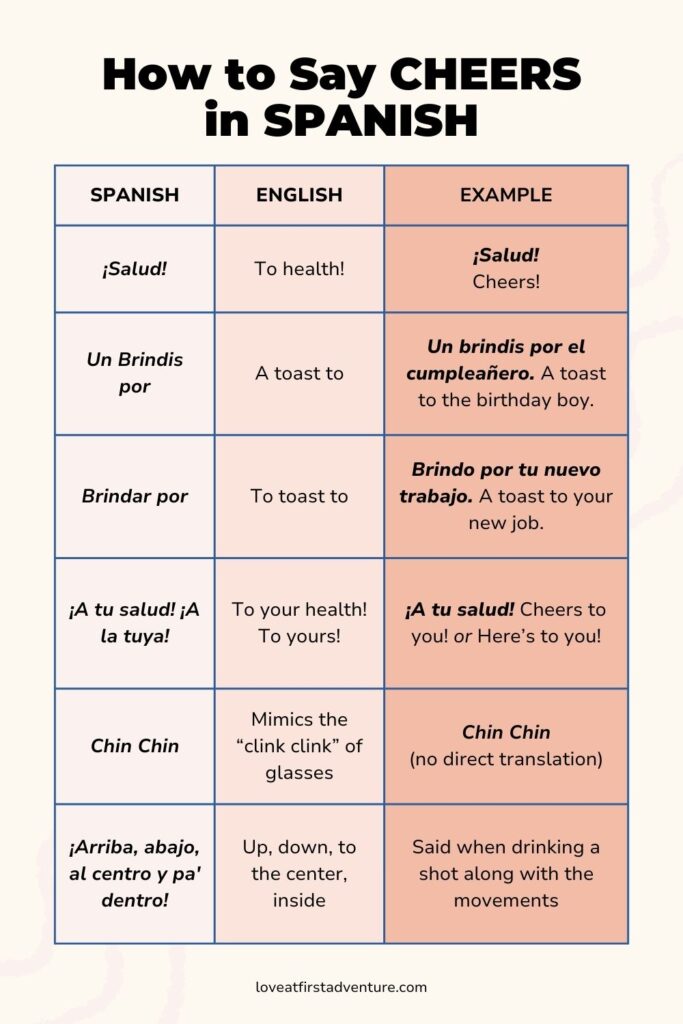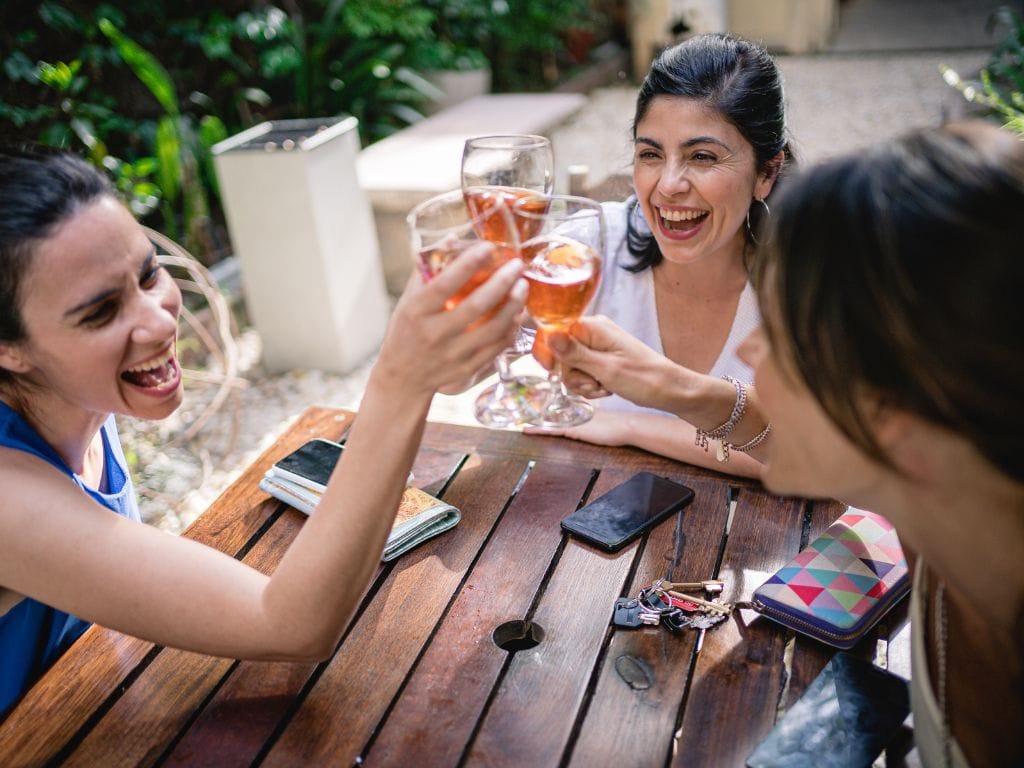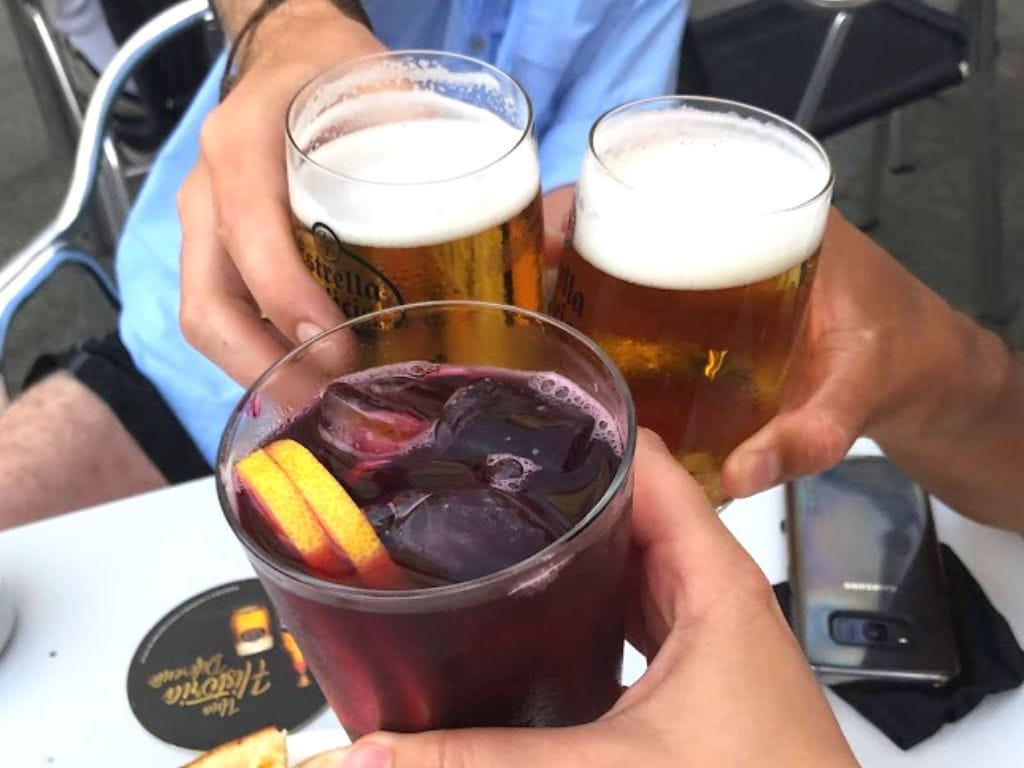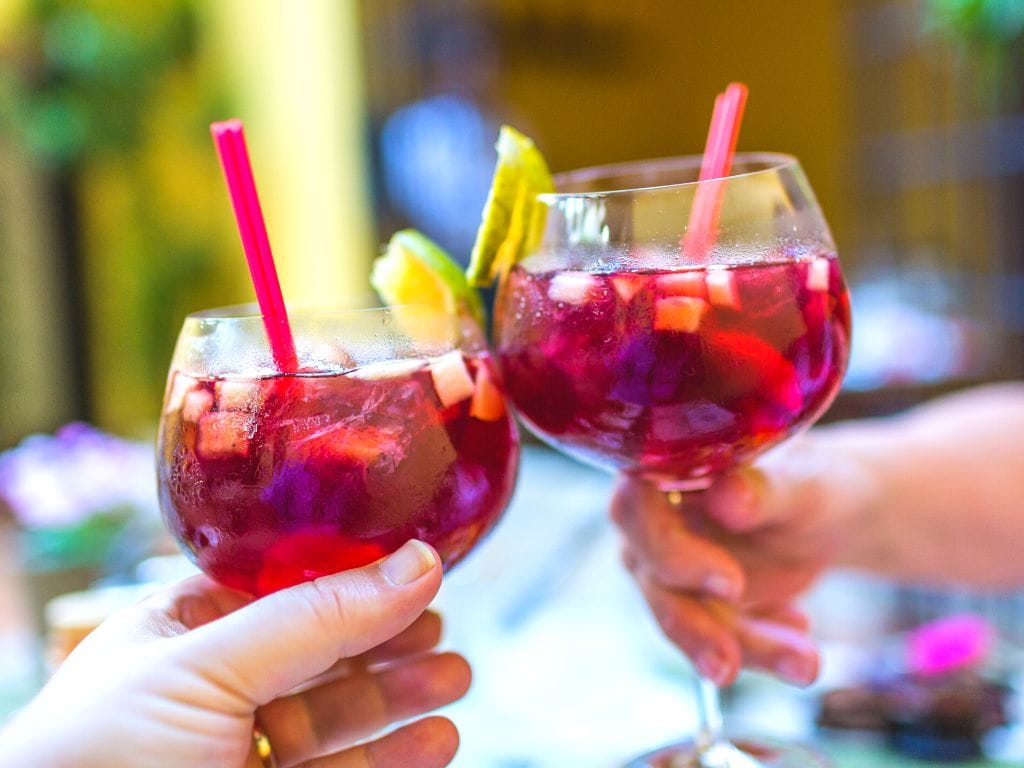13+ Ways to Say Cheers in Spanish for Any Occasion
How do you say, “cheers” in Spanish? Learn how to say cheers next time you have a celebratory drink in a Spanish-speaking country!
If you plan to travel or spend some time in a Spanish-speaking country, you may want to learn how to say cheers in Spanish.
After all, you’ll probably find yourself at some celebrations where it’s appropriate to raise a glass (alcoholic or non-alcoholic)—like celebrating your new job, wishing your friends a good trip, ringing in the New Year, or if you’re invited to a wedding.
At all these celebrations—and during regular nights, too—clinking glasses before you drink is a universal way to beckon good things, show love, and honor friendship or others’ achievements.
By the way, how do I know how to cheers in Spanish? I’m a former Spanish teacher with a Master’s degree in Foreign Language Education! But—more importantly—I’ve lived in Spain.
It was there that I learned the many different equivalents of cheers in Spanish that I’m going to share with you today.

How Do You Say Cheers in Spanish?
First things first, what is cheers in Spanish? Let’s start with the most basic and common way to toast in Spanish.
1. ¡Salud! – To health
🔊 sah-lood
Salud is the most popular way to cheers in Spanish. You may say salud term pretty much any time to toast with everyone at the table—formally or informally.
The word salud literally translates as Health, but you can think of it more as To your health!
This is a common way to toast in many Latin languages. For example, cheers in Italian is Salute and cheers in French is À votre santé. In all these languages, it’s a means of wishing each other good health, prosperity, and well-being.
Feel free to say salud on its own, or you may use it at the end of a longer speech.
Interestingly, you’ll also hear Salud when someone sneezes, which is equivalent to how American say “Bless you.”
What is Cheers in Spanish? More Equivalents of Cheers in Spanish

Although salud is the most common way to say in Spanish, “cheers” there are several other words and phrases you can use, too. Read this section to learn more.
2. Un Brindis por – A toast to
🔊 oon breen-dees pour
El brindis means toast in Spanish and is most commonly used when saying you want to give a toast to someone or something.
When you’re ready to toast, you can stand up (or stay seated if in a small group setting) and say you’d like to make a toast and follow up with who/what you’d like to make the toast for.
Here are some examples:
- Me gustaría proponer un brindis por Claudia – I’d like to propose a toast to Claudia
- Quiero hacer un brindis por el homenajeado/a – I want to make a toast the honoree
- Un brindis por tu nueva casa – A toast to your new home
- Un brindis por el cumpleañero – A toast to the birthday boy
Generally, everyone else will answer with Por (whoever you are toasting to) before clinking glasses like this:
- Por Claudia – To Claudia
- Por el homenajeado – To the honoree
- Por tu nueva casa – To your new home
- Por el cumpleañero – To the birthday boy
You (or the crowd) can also follow up the toast with Salud.
3. Brindar por – To toast to
🔊 breen-dar pour
Brindar means “to toast” in Spanish and is a common way to wish others well during all sorts of gatherings, celebrations, and special occasions.
For example, perhaps your friends are getting married. In that case, you would stand up, hold your cup high, and then make a toast to them. Similar to how people toast to honor someone in other countries.
You can use brindar + por to make your toast to a person (or to something). You can conjugate the verb brindar based on who is toasting.
- Brindo por los aquí presentes – A toast to everyone here today
- Brindo por tu nuevo trabajo – A toast to your new job
- Brindemos por los novios – Let’s toast the newlyweds
The rest of the group will typically respond with Por (whoever you are toasting to) or Salud.
You may also use the word Por by itself without using brindar or un brindis if you only want to say, “To (someone/something).”

4. Salud por eso – Cheers to that
🔊 sah-lood pour eh-so
Another way of saying cheers in Spanish is to say, Salud por eso. Salud por eso means, Cheers to that. This phrase is ideal when you want to emphasize that you agree with someone or the point they just made.
- No volveremos a la oficina a tiempo completo – We won’t be returning to the office full time
- ¡Salud por eso! – Cheers to that!
5. ¡A tu salud! ¡A la tuya! – To your health! To yours!
🔊 ah too sah-lood, ah lah too-yah
While Salud is the meaning of cheers in Spanish all by itself, there are times when it’s appropriate to wish someone good health, specifically. (Or, you might find in certain countries that these are a bit more popular.)
Literally, ¡A tu salud! translates to To your health, and ¡A la tuya! means To yours! However, you can think of these phrases more like Cheers to you! or Here’s to you!
6. Chin Chin – Clink Clink
🔊 cheen cheen
Chin chin is a cute saying meant to mimic the sound of two glasses clinking together. It’s also common in other languages around the world, too.
The phrase Chin chin (also spelled chin-chin or chinchin) is rather informal. So, you might not want to use it when giving a formal toast in front of coworkers or at a wedding!
Instead, use Chin chin with friends, family, or kids.
Because chin-chin isn’t used in every Spanish-speaking country and can even have a bad connotation in some, be careful to only use it once you’ve verified that it’s culturally appropriate.
7. ¡Arriba, abajo, al centro y pa’ dentro! – Famous Spanish Drinking Toast
🔊 Ah-ree-bah, ah-bah-ho, al sen-trow, ee, pa den-trow
¡Arriba, abajo, al centro y pa’ dentro! is a fun saying for cheers in Spanish when drinking.
Although it’s more common for younger people to say this when taking shots, it’s not always the case. Anyone can have fun with this phrase! Here’s how it works…
Once everyone has their drink, everyone does the following gestures:
- “¡Arriba” (Up) – Raise your glass high
- “¡Abajo!” (Down) – Lower your glass down
- “¡Al centro!” (To the center) – Put your glasses to the center (without clinking)
- “¡Pa’dentro!” (Inside) – Drink your drink
As this phrase is commonly used in most Spanish-speaking countries, you might find the spelling a little different, so just listen up for which version to use.
Popular Toasts in Spanish

Sometimes you may want to give a longer toast, whether you’re in a formal situation, trying to be funny, or even to use as an Instagram caption. Here are some more ways to say cheers in Spanish.
8. Estiro el brazo, doblo el codo, y me lo tomo todo!
A silly way of toasting in Spanish, this sentence means, “I stretch my arm, bend my elbow, and I drink it all!”
9. Que vivas durante todos los días de tu vida
This toast honors someone and wishes them a long and happy life and means, “May you live through all the days of your life.” You may also hear it said as, Ojalá vivas todos los días de tu vida.
10. Todo el mundo debería creer en algo. Yo creo que debemos tomar otra copa.
“Everyone should believe in something. I believe we should have another drink.” is a funny way to say cheers in Spanish.
11. No creerse que brindar es cosa sencilla, pero como tengo buena compañía y una buena silla, beberemos y disfrutaremos por un día. ¡Salud!
A common toast you may hear in Spanish-speaking countries is this one, which translates in English (inglés) to “Not believing that toasting is a simple thing, but since I have good company and a good chair, we will drink and enjoy ourselves for a day. Cheers!”
12. Salud, amor, pesetas y tiempo para disfrutarlos
Salud, amor, pesetas y tiempo para disfrutarlos can be thought of as the longer version of Salud. Use this to wish everyone “Health, love, money and time to enjoy them.”
Depending on the country you are in, people may substitute the word disfrutar for gozar (to enjoy) or gastar (the spend).
13. Que vivan los novios
If you’re at a wedding, use ¡Que vivan los novios! to wish the bride and groom a happy and long life together. It loosely means, “To the bride and groom!” To respond to someone else giving this toast, you can simply say ¡Viva!
How to Say Cheers in Barcelona

In Barcelona, people speak Catalan in addition to Spanish. The Catalonian community boasts its own rich culture and traditions. Thus, you’ll hear a few other versions of toasts when you visit Barcelona—some of which are quite shameless!
✅ Salut – To health
🔊 sah-loot
Salut is how to say cheers in Catalan. Just like in Spanish, you can Salut (Health, To your health!) any time to toast with everyone at the table—formally or informally.
✅ Salut i força al canut – To health and money
🔊 sah-loot ee for-sah al kah-noot
An informal saying in Catalan is Salut i força al canut. This means “Health and strength to your cylinder”. It’s a way of wishing people health and money as people used to carry gold inside leather cylinders—although it does have a bit of a naughty connotation, so you may want to avoid saying it.
✅ Sant Hilari, Sant Hilari… – Hidalgo, Hidalgo…
🔊 sahnt he-lah-ree, sahnt he-lah-ree
This toast invites everyone to down their drinks but does require a response with bad language. You may want to avoid it, and certainly don’t use it in a formal setting!
Toasting & Drinking Etiquette in Spanish-speaking Countries

Now that you’ve learned how to say cheers in Spanish, here’s some basic etiquette around giving and receiving toasts. Much of this etiquette is universal, meaning it may be the same in your country!
- Always make eye contact with the person you are clinking your glass with, or you’ll have bad luck!
- The first toast should be made by the host.
- Don’t leave during the toast.
- Don’t drink until everyone says, ¡Salud! It’s considered bad form to drink before the toast is done.
- Try not to spill your drink, or you might have bad luck.
- Always toast with a full glass!
Other Useful Words Related to Cheers in Spanish
When saying cheers in Spanish, you may find these Spanish words related to Spanish toasts and celebrations helpful.
✔ Bottoms up! – ¡Hasta el fondo!
✔ Congratulations! – ¡Enhorabuena!
✔ Happy Birthday! – ¡Feliz cumpleaños!
✔ to drink – beber
✔ drink – la bebida
✔ to drink a toast to – brindar por
✔ champagne – champán
✔ friends – amigos/as
✔ to honor – honrar
✔ in honor of – en honor a
✔ marriage – el matrimonio
✔ to propose a toast to – proponer un brindis por
✔ wedding – la boda
How to Say Cheers in Spanish: FAQ
What does Salud mean when doing Spanish cheers?
Salud means “Health” in Spanish. When you say Salud while doing cheers, you are basically wishing everyone (or a certain person) good health.
How do you respond to Salud?
Typically you, respond to the Spanish version of cheers, Salud, with the same word: Salud. You can also clarify what you are toasting to by saying, “Por (something/someone)”.
How do you say Cheers in Spanish meaning thanks?
If you want to say in Spanish Cheers to mean Thanks or Thank You like in British English, use Gracias.
What is a Spanish drinking toast?
The most popular Spanish drinking toast is to say, Salud! Salud literally means Health, but it can be used just about any time—formally or informally—to wish others a good time, congratulate them, or encourage them.
How do you spell cheers in Spanish?
Cheers in Spanish is Salud. Salud is spelled s-a-l-u-d.
How do you cheers in Spanish?
Doing cheers in Spanish is very much like in your home country. Everyone raises a glass while one (or more) people say a few words. Then, everyone clinks their glass and says an appropriate response like “Salud!”
Why do Spanish people say Salud?
The Spanish word salud comes from the Latin word salus, meaning health, but also safety, salvation, and welfare. So why do Spanish people say Salud? Firstly, salud is the Spanish word for “health”. However, Spanish people commonly say, Salud to mean Cheers! when toasting drinks and also when someone sneezes.
What is the up down toast in Spanish?
The toast that you may have seen on TV or in a bar or restaurant that invites everyone to raise their glass up, down, to the center, and then to drink is: Arriba, abajo, al centro, y adentro.
Where do they say Salud?
To say cheers, many countries say something similar to the Spanish Salud which is similar to saying, “To your health!” For example, cheers in Italian is Salute, cheers in French is À votre santé, and cheers in Portugal is Saúde.
What do Spanish people say after a sneeze?
Most Spanish-speaking people say Salud after someone sneezes as a way of wishing them good health and blessings.
Cheers in Spanish: Wrapping Up
After reading this guide on different ways to say cheers in Spanish, you’re prepared to toast in Spanish-speaking countries!
Learning these phrases will help you communicate, understand what’s going on around you, and participate fully in the culture of each country that you visit—one of the many goals of language learning.
And to that we say, Cheers to that! ¡Salud por eso!
Spanish Language Guides
Want to practice or learn Spanish? Check out these additional Spanish resources! ⤵
